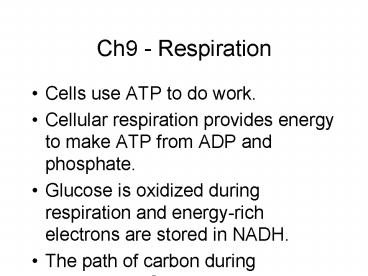Ch9 Respiration - PowerPoint PPT Presentation
1 / 32
Title:
Ch9 Respiration
Description:
Cellular respiration provides energy to make ATP from ADP and phosphate. ... In oxidation, fall towards electronegative atoms such as O. Energy is released. ... – PowerPoint PPT presentation
Number of Views:22
Avg rating:3.0/5.0
Title: Ch9 Respiration
1
Ch9 - Respiration
- Cells use ATP to do work.
- Cellular respiration provides energy to make ATP
from ADP and phosphate. - Glucose is oxidized during respiration and
energy-rich electrons are stored in NADH. - The path of carbon during respiration
Glycolysis and the Krebs cycle.
2
Outline continued
- NADH is oxidized by molecular oxygen in electron
transfer. - ATP is formed by oxidative phosphorylation
(chemiosmosis) - Fermentation is an alternative pathway for ATP
formation - Control mechanisms for respiration.
3
Energy is required for
- Maintenance of life (keeping entropy low)
- Growth etc.
- Synthesis of macromolecules
- Membrane transport
- Motion
- Cell division
4
Cells use ATP to do work.
5
Cellular work - roles for ATP
6
Catabolism breakdown -- releases energy
7
ATP synthesis requires energy
8
Catabolism
9
The breakdown of glucose provides energy.
- C6H12O6 6 O2 6 CO2 6H2O
Energy
ATP Heat
DG -686 cal/mole
10
Energy flow
11
Oxidation-Reduction (Redox) reactions
12
Example
13
General Formula
Oxidation
Xe Y X Ye
Reduction
14
Glucose is oxidized during respiration.
15
Oxidation of methane
16
High energy electrons
- Glucose methane
- Compounds with H atoms
- In oxidation, fall towards electronegative atoms
such as O - Energy is released.
17
(No Transcript)
18
Oxidation of glucose is a stepwise process
Oxidation
- - C - OH NAD CO NADH
Reduction
19
NADH
NAD
2H from food
20
The path of carbon Glycolysis and the Krebs cycle
21
(No Transcript)
22
Glycolysis
Glucose 2 ADP 2 NAD 2 pyruvate 2 ATP 2
NADH
23
Energy Investment Phase
24
(No Transcript)
25
Net
26
Substrate Level Phosphorylation
27
Types of Energy-rich Molecules
- ATP
- NADH
28
Conversion of pyruvate to acetyl-CoA
29
What is acetyl-CoA?
30
(No Transcript)
31
What is FADH2?
32
Chemical balance per glucose































